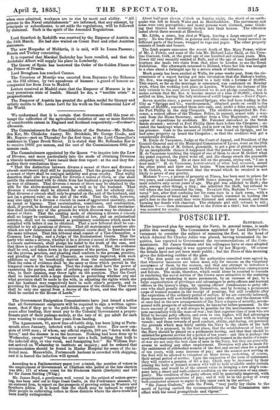POSTSCRIPT.
SATURDAY.
The improved plan for manning the Navy, in general terms, is made public this morning. The Commission appointed by Lord Derby's Go- vernment to consider the subject of manning the fleet, at the head of which Admiral Sir Charles Adam was placed, having terminated its in- quiries, has reported to Government the recommendations of the Com- missioners. Sir James Graham and his colleagues have at once adopted the plan ; and yesterday it was approved of by her Majesty. Of course the details have not yet been made public ; but the Times of this morning gives the following outline of the plan. "The first point on which all the authorities consulted were agreed is, that whatever measures are taken must rely for success on the voluntary acceptance of them by the seamen, and that any attempt to introduce a coercive mode of enlistment would be followed by mischievous consequences and failure. The mode, therefore, which could alone be resorted to consists in rendering the naval service of the Crown more attractive to the seafaring population, by rendering it more permanent., by an increase of pay, by a large augmentation of privileges and advantages to petty officers and warrant officers in the Queen's ships, by opening officers' commissions to petty offi- cers who shall greatly distinguish themselves, and by forming a permanent corps of trained seamen in the receipt of pensions, but still available after the expiration of the ordinary period of service. If we are correctly informed, these measures will now forthwith be carried into effect, and the seaman will at once find in the new arrangements of the Navy a degree of security, accom- panied with prospects of advancement, he has never before possessed. In the mere amount of pay it will always be possible for the merchantman to com- pete successfully with the man-of-war ; but that superior class of men who are fitted to become petty officers, and even to rise higher, will find advantages in the Queen's service which they can scarcely even meet with in trading vessels ; and these rewards of good conduct, ability, and daring, are precisely the grounds which may fairly entitle the Navy to the choice of the best hands. It is proposed i , n the first place, that the establishment of boys for the Navy should be placed on a permanent footing, and that they should be enlisted for general service for a period of ten years : and this is perhaps the most important condition of all, for lads perfectly trained in the duties of a man- of-war are not only the best class of men in the Navy, but they are generally averse to seeking any other employment. Provision will also be made for the enlistment of ablebodied seamen of the first and second class for a period of ten years, with some increase of pay ; and the seamen now serving in the fleet will be allowed to volunteer on these terms, reckoning, of course, their actual period of service. Upon the expiration of the term of enlistment they will receive a pension of Cid. a day, which may be increased by their joining the body of trained seamen who will be held available under certain conditions, and would be of the utmost value in bringing a raw shies com- pany into a smart and well-ordered condition on the occurrence of any emer- gency. The condition of the petty officers will be materially improved, with proportionate augmentations of pay ; and it will be in the power of every well-conducted seaman to aspire to this upper rank in the service." "Sir James Graham " adds the Times "may justly lay claim to the merit of having carried the recommendations of the Commission into effect with his usual promptitude and vigour."


























 Previous page
Previous page